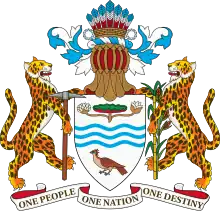 | |
National anthem of | |
| Lyrics | Archibald Leonard Luker |
|---|---|
| Music | Robert Cyril Gladstone Potter |
| Adopted | 1966 |
| Audio sample | |
U.S. Navy Band instrumental version (one verse)
| |
"Green Land of Guyana" is the national anthem of Guyana. Robert Cyril Gladstone Potter composed the music, while the lyrics were authored by Archibald Leonard Luker. Two separate contests were held to determine the words and the tune, respectively. It was adopted as the national anthem in 1966, when the country gained independence from the United Kingdom.
History
The British amalgamated the formerly Dutch colonies of Berbice, Demerara and Essequibo in 1814 into a single colony – British Guiana – and ruled over it until 1966.[1] During the run up to independence in the early 1960s, several attempts were made by government committees to select the text to the new national anthem, but they all resulted in an impasse. Finally, in 1965, a fresh contest was held, and a new committee was formed, composed of individuals who possessed "broad literary and poetic backgrounds".[2] The criteria they formulated for the anthem was that it should be august, inspire a love of country and evoke its unique characteristics, while at the same time be uncomplicated enough so that it could be comprehended by children. It was also supposed to be politically neutral, secular and dissimilar to the national anthems of other countries.[2]
The competition saw a total of 266 entries submitted. The committee first narrowed this down to 40, and from that they chose 12 finalists. The lyrics penned by Archibald Leonard Luker were ultimately selected.[2][3] A second contest was subsequently held to determine the music that was to accompany these lyrics. Another committee, consisting of a hundred people, selected from a blind audition. The identities of the composers were not revealed to them, so they chose from numbers that corresponded to the respective songs.[2] In the end, a tune composed by Cyril Potter was chosen.[2][3]
Lyrics
The first stanza of "Dear Land of Guyana, of Rivers and Plains" alludes to the country's geography.[2] The other verses personify Guyana as a mother to its citizens, who have a duty of respect and protection of her.[2]
I |
References
- ↑ Richardson, Bonham C.; Menke, Jack K. (October 21, 2019). "Guyana – History". Encyclopedia Britannica. Encyclopedia Britannica, Inc. Retrieved May 13, 2020.
- 1 2 3 4 5 6 7 Cambridge, Vibert C. (May 21, 2015). Musical Life in Guyana: History and Politics of Controlling Creativity. University Press of Mississippi. pp. 209–213. ISBN 9781626746442.
- 1 2 "Guyana". The World Factbook. CIA. March 15, 2020. Retrieved May 13, 2020.
- ↑ People's National Congress (1977). Constitution, People's National Congress of Guyana. The Congress. p. 62.
- ↑ Guyana Ministry of Information Publications Unit (1986). The Co-operative Republic of Guyana at a Glance. Publications Unit, Ministry of Information. p. 10.
- ↑ Whitehead, Neil L.; Alemán, Stephanie W. (2009). Anthropologies of Guayana: Cultural Spaces in Northeastern Amazonia. University of Arizona Press. p. 194. ISBN 978-0-8165-2607-9.